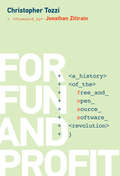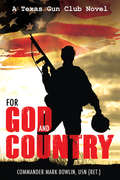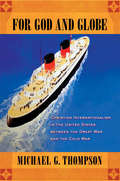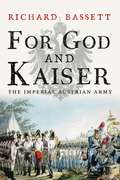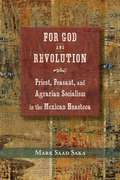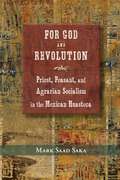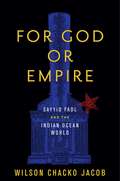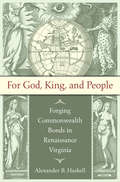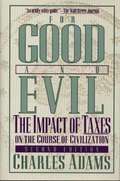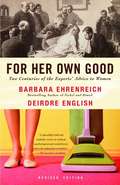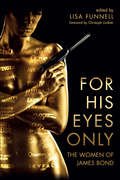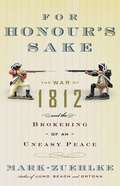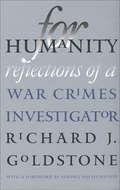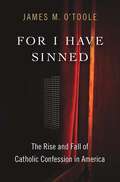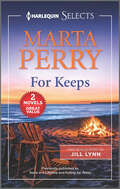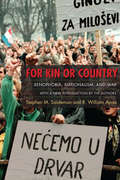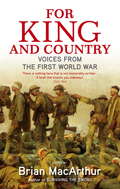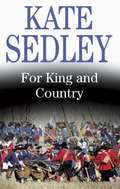- Table View
- List View
For Fun and Profit: A History of the Free and Open Source Software Revolution (History of Computing)
by Christopher TozziThe free and open source software movement, from its origins in hacker culture, through the development of GNU and Linux, to its commercial use today.In the 1980s, there was a revolution with far-reaching consequences—a revolution to restore software freedom. In the early 1980s, after decades of making source code available with programs, most programmers ceased sharing code freely. A band of revolutionaries, self-described “hackers,” challenged this new norm by building operating systems with source code that could be freely shared. In For Fun and Profit, Christopher Tozzi offers an account of the free and open source software (FOSS) revolution, from its origins as an obscure, marginal effort by a small group of programmers to the widespread commercial use of open source software today. Tozzi explains FOSS's historical trajectory, shaped by eccentric personalities—including Richard Stallman and Linus Torvalds—and driven both by ideology and pragmatism, by fun and profit.Tozzi examines hacker culture and its influence on the Unix operating system, the reaction to Unix's commercialization, and the history of early Linux development. He describes the commercial boom that followed, when companies invested billions of dollars in products using FOSS operating systems; the subsequent tensions within the FOSS movement; and the battles with closed source software companies (especially Microsoft) that saw FOSS as a threat. Finally, Tozzi describes FOSS's current dominance in embedded computing, mobile devices, and the cloud, as well as its cultural and intellectual influence.
For God and Country: A Texas Gun Club Novel (The Texas Gun Club #3)
by Commander Mark BowlinIn WWII Italy, two soldiers have been granted a week of leave—but R&R is not in the cards for them…January 1944: The great Allied advance up the Italian peninsula has come to a halt before the formidable German Gustav Line at Monte Cassino. For the American soldiers in the valley, there is nothing to do but wait as General Mark Clark prepares his plan to shatter the German defenses and continue Fifth Army&’s march to Rome. Captain Perkin Berger and First Lieutenant Sam Taft are spared the monotony of waiting. They&’re given a week of well-deserved leave in an Adriatic resort town, where they have no responsibility other than relaxation. Proving the old maxim that no plan survives first contact with the enemy, Sam and Perk find themselves involved in the Canadian battle at Ortona, and once again they are thrust into the middle of a secret war between the Third Reich and the Vatican. When the cousins return from their R&R, it isn&’t long until the order is given. Against all sound military judgment, the exhausted and under-strength Gun Club is to cross the Rapido River and breach the Gustav Line—alone…
For God and Globe: Christian Internationalism in the United States between the Great War and the Cold War (The United States in the World)
by Michael G. ThompsonFor God and Globe recovers the history of an important yet largely forgotten intellectual movement in interwar America. Michael G. Thompson explores the way radical-left and ecumenical Protestant internationalists articulated new understandings of the ethics of international relations between the 1920s and the 1940s. Missionary leaders such as Sherwood Eddy and journalists such as Kirby Page, as well as realist theologians including Reinhold Niebuhr, developed new kinds of religious enterprises devoted to producing knowledge on international relations for public consumption. For God and Globe centers on the excavation of two such efforts—the leading left-wing Protestant interwar periodical, The World Tomorrow, and the landmark Oxford 1937 ecumenical world conference. Thompson charts the simultaneous peak and decline of the movement in John Foster Dulles's ambitious efforts to link Christian internationalism to the cause of international organization after World War II. Concerned with far more than foreign policy, Christian internationalists developed critiques of racism, imperialism, and nationalism in world affairs. They rejected exceptionalist frameworks and eschewed the dominant "Christian nation" imaginary as a lens through which to view U.S. foreign relations. In the intellectual history of religion and American foreign relations, Protestantism most commonly appears as an ideological ancillary to expansionism and nationalism. For God and Globe challenges this account by recovering a movement that held Christian universalism to be a check against nationalism rather than a boon to it.
For God and Kaiser
by Richard BassettAmong the finest examples of deeply researched and colorfully written military history, Richard Bassett's For God and Kaiser is a major account of the Habsburg army told for the first time in English. Bassett shows how the Imperial Austrian Army, time and again, was a decisive factor in the story of Europe, the balance of international power, and the defense of Christendom. Moreover it was the first pan-European army made up of different nationalities and faiths, counting among its soldiers not only Christians but also Muslims and Jews. Bassett tours some of the most important campaigns and battles in modern European military history, from the seventeenth century through World War I. He details technical and social developments that coincided with the army's story and provides fascinating portraits of the great military leaders as well as noteworthy figures of lesser renown. Departing from conventional assessments of the Habsburg army as ineffective, outdated, and repeatedly inadequate, the author argues that it was a uniquely cohesive and formidable fighting force, in many respects one of the glories of the old Europe.
For God and Revolution: Priest, Peasant, and Agrarian Socialism in the Mexican Huasteca
by Mark Saad SakaThis account traces the material and ideological roots of the rebellion to nineteenth-century liberal policies of land privatization and to the growth of a radical anarchocommunist agrarian consciousness. Elite landholders had held sway in the Mexican state of San Luis Potosí since colonial times. In the nineteenth century their seizures of agricultural lands clashed with the rising political consciousness of the Huastecos, who rose up to fight for their way of life. Saka further traces the roots of the Huasteco rebellion to the grassroots religiosity that had developed in the course of centuries of local clerical leadership as well as to a nationalism derived from Huastecan participation in Mexico's wars against the United States in the 1840s and France in the 1860s.
For God and Revolution: Priest, Peasant, and Agrarian Socialism in the Mexican Huasteca
by Mark Saad SakaDuring the early 1880s, a wave of peasant unrest swept the mountainous Huasteca region of northeastern Mexico. The rebels demanded political autonomy for their pueblos, protection for their churches, and restoration of the land, water, and foraging rights that were a part of their heritage—issues with nationwide implications that foreshadowed the revolution of 1910. This account traces the material and ideological roots of the rebellion to nineteenth-century liberal policies of land privatization and to the growth of a radical anarchocommunist agrarian consciousness.Elite landholders had held sway in the Mexican state of San Luis Potosí since colonial times. In the nineteenth century their seizures of agricultural lands clashed with the rising political consciousness of the Huastecos, who rose up to fight for their way of life. Saka further traces the roots of the Huasteco rebellion to the grassroots religiosity that had developed in the course of centuries of local clerical leadership as well as to a nationalism derived from Huastecan participation in Mexico&’s wars against the United States in the 1840s and France in the 1860s.
For God or Empire: Sayyid Fadl and the Indian Ocean World
by Wilson Chacko JacobSayyid Fadl, a descendant of the Prophet Muhammad, led a unique life—one that spanned much of the nineteenth century and connected India, Arabia, and the Ottoman Empire. For God or Empire tells his story, part biography and part global history, as his life and legacy afford a singular view on historical shifts of power and sovereignty, religion and politics. Wilson Chacko Jacob recasts the genealogy of modern sovereignty through the encounter between Islam and empire-states in the Indian Ocean world. Fadl's travels in worlds seen and unseen made for a life that was both unsettled and unsettling. And through his life at least two forms of sovereignty—God and empire—become apparent in intersecting global contexts of religion and modern state formation. While these changes are typically explained in terms of secularization of the state and the birth of rational modern man, the life and afterlives of Sayyid Fadl—which take us from eighteenth- and nineteenth-century Indian Ocean worlds to twenty-first century cyberspace—offer a more open-ended global history of sovereignty and a more capacious conception of life.
For God, King, and People: Forging Commonwealth Bonds in Renaissance Virginia (Published by the Omohundro Institute of Early American History and Culture and the University of North Carolina Press)
by Alexander B. HaskellBy recovering a largely forgotten English Renaissance mindset that regarded sovereignty and Providence as being fundamentally entwined, Alexander Haskell reconnects concepts historians had before treated as separate categories and argues that the first English planters in Virginia operated within a deeply providential age rather than an era of early modern entrepreneurialism. These men did not merely settle Virginia; they and their London-based sponsors saw this first successful English venture in America as an exercise in divinely inspired and approved commonwealth creation. When the realities of Virginia complicated this humanist ideal, growing disillusionment and contention marked debates over the colony. Rather than just "selling" colonization to the realm, proponents instead needed to overcome profound and recurring doubts about whether God wanted English rule to cross the Atlantic and the process by which it was to happen. By contextualizing these debates within a late Renaissance phase in England, Haskell links increasing religious skepticism to the rise of decidedly secular conceptions of state power. Haskell offers a radical revision of accepted narratives of early modern state formation, locating it as an outcome, rather than as an antecedent, of colonial endeavor.
For Good and Evil: The Impact of Taxes on the Course of Civilization (2nd edition)
by Charles AdamsThe very word "taxes" sends shivers up spines. Yet very few realize the tremendous impact that taxation has had on civilization. Charles Adams changes that in this newly revised and enlarged edition of his fascinating history. Taxation, says Adams, has been a catalyst of history, a powerful influence on and sometimes the direct cause of many of the famous events that have marched across the world's stage as empires collided and battled for the right to tax the loser. For Good and Evil is the first book to examine how taxation has been a key factor in world events. Like the Rosetta Stone--itself a tax document--the book sheds fresh light onto much of history. Did you know that biblical Israel split after Solomon's death because his son refused to cut taxes? That Rome rose to greatness because of a liberal tax regime but declined under corrupt and inefficient ones? That in Britain Lady Godiva made her famous ride as a tax protest? That in Switzerland William Tell was made to shoot the apple off his son's head as punishment for tax resistance? Or that Fort Sumter, where the first shots of the Civil War were fired, was a Customs House? Combining facts with thought-provoking comment Adams frequently draws parallels between tax events of the past and those of the present. Finding fault with the way Western civilization is taxed, he provides ideas for curing those faults by using the valuable lessons that history has taught. The special value of this refreshing look at history lies in the lessons to be drawn by all taxpayers: "Taxes are the fuel that makes civilization run, but how we tax and spend determines to a large extent whether we are prosperous or poor, free or enslaved, and most importantly, good or evil." Once you read For Good and Evil, you'll never feel the same about taxes.
For Her Love
by Paula Reed"Life is like that, Grace. Sometimes you sail with nothing to trust but the stars ... It all works out if you plot your course carefully." Giles Courtney may be the captain of his own ship, but he's not yet certain he's the master of his destiny. His reckless privateering days behind him, Giles is determined to make a respectable name for himself, yet where to begin is the question at hand--especially when he must inform his first patron that his convictions forbid him to traffic in slaves. But while wealthy sugar planter Edmund Welbourne is astounded by Giles' refusal, his beautiful daughter Grace is quite obviously intrigued--and Giles is instantly attracted. As intelligent and spirited as she is lovely, Grace is everything Giles wants in a wife--but their hasty marriage soon proves to be a challenge that will test everything both of them believe about the nature of freedom and the overwhelming power of love Paula Reed was a full-time English teacher at Columbine High School of Littleton, Colorado. After surviving the tragic shootings there, she, like many students and teachers who were there that day, decided to reinvent her life by pursuing her true passion--writing romance novels--while continuing to teach. Ms. Reed lives in the Denver area. Visit her Web site: www.paula-reed.com.
For Her Own Good: Two Centuries of the Experts Advice to Women
by Barbara Ehrenreich Deirdre EnglishA provocative new perspective on female history, the history of American medicine and psychology, and the history of child-rearing unlike any other.
For Her Own Good: Two Centuries of the Experts' Advice to Women
by Barbara Ehrenreich Deirdre EnglishA provocative new perspective on female history, the history of American medicine and psychology, and the history of child-rearing unlike any other.
For His Eyes Only
by Lisa FunnellThe release of Skyfall in 2012 marked the fiftieth anniversary of the James Bond film franchise. It earned over one billion dollars in the worldwide box office and won two Academy Awards. Amid popular and critical acclaim, some have questioned the representation of women in the film. From an aging M to the limited role of the Bond Girl and the characterization of Miss Moneypenny as a defunct field agent, Skyfall develops the legacy of Bond at the expense of women. Since Casino Royale (2006) and its sequels Quantum of Solace (2008) and Skyfall constitute a reboot of the franchise, it is time to question whether there is a place for women in the new world of James Bond and what role they will play in the future of series. This volume answers these questions by examining the role that women have historically played in the franchise, which greatly contributed to the international success of the films. This anthology constitutes the first book-length academic study on femininity and feminism in the Bond series. It covers all twenty-three Eon productions as well as the spoof Casino Royale (1967), considering a range of factors that have shaped the depiction of women in the franchise, including female characterization in Ian Fleming's novels; the vision of producer Albert R. Broccoli and other creative personnel; the influence of feminism; and broader trends in British and American film and television. The volume provides a timely look at women in the Bond franchise and offers new scholarly perspectives on the subject.
For His Eyes Only: The Women of James Bond
by Lisa FunnellThe release of Skyfall in 2012 marked the fiftieth anniversary of the James Bond film franchise. It earned over one billion dollars in the worldwide box office and won two Academy Awards. Amid popular and critical acclaim, some have questioned the representation of women in the film. From an aging M to the limited role of the Bond Girl and the characterization of Miss Moneypenny as a defunct field agent, Skyfall develops the legacy of Bond at the expense of women.Since Casino Royale (2006) and its sequels Quantum of Solace (2008) and Skyfall constitute a reboot of the franchise, it is time to question whether there is a place for women in the new world of James Bond and what role they will play in the future of series. This volume answers these questions by examining the role that women have historically played in the franchise, which greatly contributed to the international success of the films.This academic study constitutes the first book-length anthology on femininity and feminism in the Bond series. It covers all twenty-three Eon productions as well as the spoof Casino Royale (1967), considering a range of factors that have shaped the depiction of women in the franchise, including female characterization in Ian Fleming's novels; the vision of producer Albert R. Broccoli and other creative personnel; the influence of feminism; and broader trends in British and American film and television. The volume provides a timely look at women in the Bond franchise and offers new scholarly perspectives on the subject.
For Honour's Sake: The War of 1812 and the Brokering of an Uneasy Peace
by Mark ZuehlkeIn the tradition of Margaret MacMillan's Paris 1919 comes a new consideration of Canada's most famous war and the Treaty of Ghent that unsatisfactorily concluded it, from one of this country's premier military historians. In the Canadian imagination, the War of 1812 looms large. It was a war in which British and Indian troops prevailed in almost all of the battles, in which the Americans were unable to hold any of the land they fought for, in which a young woman named Laura Secord raced over the Niagara peninsula to warn of American plans for attack (though how she knew has never been discovered), and in which Canadian troops burned down the White House. Competing American claims insist to this day that, in fact, it was they who were triumphant.But where does the truth lie? Somewhere in the middle, as is revealed in this major new reconsideration from one of Canada's master historians. Drawing on never-before-seen archival material, Zuehlke paints a vibrant picture of the war's major battles, vividly re-creating life in the trenches, the horrifying day-to-day manoeuvring on land and sea, and the dramatic negotiations in the Flemish city of Ghent that brought the war to an unsatisfactory end for both sides. By focusing on the fraught dispute in which British and American diplomats quarrelled as much amongst themselves as with their adversaries, Zuehlke conjures the compromises and backroom deals that yielded conventions resonating in relations between the United States and Canada to this very day.From the Hardcover edition.
For Humanity's Sake
by Lina SteinerFor Humanity's Sake is the first study in English to trace the genealogy of the classic Russian novel, from Pushkin to Tolstoy to Dostoevsky. Lina Steiner demonstrates how these writers' shared concern for individual and national education played a major role in forging a Russian cultural identity.For Humanity's Sake highlights the role of the critic Apollon Grigor'ev, who was first to formulate the difference between West European and Russian conceptions of national education or Bildung -- which he attributed to Russia's special sociopolitical conditions, geographic breadth, and cultural heterogeneity. Steiner also shows how Grigor'ev's cultural vision served as the catalyst for the creative explosion that produced Russia's most famous novels of the 1860s and 1870s.Positing the classic Russian novel as an inheritor of the Enlightenment's key values -- including humanity, self-perfection, and cross-cultural communication -- For Humanity's Sake offers a unique view of Russian intellectual history and literature.
For Humanity: Reflections of a War Crimes Investigator
by Richard J. GoldstoneThroughout his career, the distinguished South African jurist Richard J. Goldstone has been deeply committed to promoting human rights in his own country and abroad. A justice of the Constitutional Court of South Africa since 1994, he has also served as chairperson of the Commission of Inquiry Regarding the Prevention of Public Violence and Intimidation in South Africa and chief prosecutor of the United Nations International Criminal Tribunals for the former Yugoslavia and Rwanda. In this engrossing and inspiring book, Justice Goldstone provides an intimate account of his progression from a young activist opposing South Africa's racial policies to the world's first independent war crimes prosecutor. Justice Goldstone begins by describing how he became involved in the transition of South Africa from an apartheid state to a democracy and why he was chosen in late 1992 to head the commission that investigated criminal conduct that accompanied that transition. He then considers his time as chief prosecutor for the United Nations Tribunals, speaking not only of the fundamental legal issues that have arisen but also of his personal experiences and feelings. Arguing in favor of the move toward establishing a permanent international criminal court, he offers a stirring defense of the role of international tribunals in holding human rights violators accountable.
For I Have Sinned: The Rise and Fall of Catholic Confession in America
by James M. O’TooleThe remarkable story of how confession became a defining rite for American Catholics—and then, beginning in the 1970s, all but disappeared.For generations, American Catholics went faithfully to confession, admitting their sins to a priest and accepting through him God’s forgiveness. The sacrament served as a distinctive marker of Catholic identity, shaping parishioners’ views of their relationship to God, their neighbors, and the wider world. But starting in the 1970s, many abandoned confession altogether. Focusing on the experiences of both laypeople and priests, James M. O’Toole reconstructs the history of confession’s steady rise—and dramatic fall—among American Catholics.In the early United States, the Catholic Church grew rapidly—and with it, confession’s centrality. Although the sacrament was practiced unevenly for much of the nineteenth century, frequent confession became common by the early twentieth. Both priests and parishioners understood confession as a ritual crucial for the soul, while on a social level, it established Catholic distinctiveness within a largely Protestant country. Today, however, even faithful Catholics seldom confess. The reasons for this change, O’Toole reveals, include the emergence of psychology and other forms of counseling; the Church’s stance against contraception, which alienated many parishioners; and a growing sense of confession’s inability to confront social problems like structural racism, poverty, and sexism. Meanwhile, increasing recognition of sexual abuse within the Church further undermined trust in clergy as confessors.Sensitively attuned to the historical importance of confession, For I Have Sinned also suggests that, if the sacrament no longer serves the needs of US Catholics, the Church and its members might find new ways to express their ideals in the twenty-first century.
For Keeps: A 2-in-1 Collection
by Marta PerryLove when you least expect itTwice in a Lifetime by Marta Perry When Georgia Lee Bodine learns her grandmother hired Matthew Harper to carry out her eccentric requests and unearth an old family secret, she plans to send the lawyer packing. But Georgia soon discovers how much the widowed father cares about her grandmother. And as they work together on the Bodine family history, the couple uncover a surprise about themselves: that love can strike twice in a lifetime.FREE BONUS STORY INCLUDED IN THIS VOLUME!Falling for Texas by Jill Lynn Raising his orphaned teenage sister isn’t easy for Texas rancher Cash Maddox. But when he asks new teacher Olivia Grayson for help, Cash faces an even tougher challenge. He made a promise that he wouldn’t get distracted from his mission of being a good father figure. Yet Olivia’s kindness and quick wit are drawing him closer every day. Could it be time to make a new vow…one that’ll last a lifetime?
For Kin or Country
by R. William Ayres Stephen M. SaidemanThe collapse of an empire can result in the division of families and the redrawing of geographical boundaries. New leaders promise the return of people and territories that may have been lost in the past, often advocating aggressive foreign policies that can result in costly and devastating wars. The final years of the Austro-Hungarian and Ottoman empires, the end of European colonization in Africa and Asia, and the demise of the Soviet Union were all accompanied by war and atrocity.These efforts to reunite lost kin are known as irredentism ? territorial claims based on shared ethnic ties made by one state to a minority population residing within another state. For Kin or Country explores this phenomenon, investigating why the collapse of communism prompted more violence in some instances and less violence in others. Despite the tremendous political and economic difficulties facing all former communist states during their transition to a market democracy, only Armenia, Croatia, and Serbia tried to upset existing boundaries. Hungary, Romania, and Russia practiced much more restraint.The authors examine various explanations for the causes of irredentism and for the pursuit of less antagonistic policies, including the efforts by Western Europe to tame Eastern Europe. Ultimately, the authors find that internal forces drive irredentist policy even at the risk of a country's self-destruction and that xenophobia may have actually worked to stabilize many postcommunist states in Eastern Europe.
For Kin or Country: Xenophobia, Nationalism, and War
by Stephen M. Saideman R. William AyresFor Kin or Country investigates why the collapse of communism prompted more violence in some instances and less violence in others.
For Kin or Country: Xenophobia, Nationalism, and War
by R. William Ayres Stephen SaidemanThe collapse of an empire can result in the division of families and the redrawing of geographical boundaries. New leaders promise the return of people and territories that may have been lost in the past, often advocating aggressive foreign policies that can result in costly and devastating wars. The final years of the Austro-Hungarian and Ottoman empires, the end of European colonization in Africa and Asia, and the demise of the Soviet Union were all accompanied by war and atrocity.These efforts to reunite lost kin are known as irredentism—territorial claims based on shared ethnic ties made by one state to a minority population residing within another state. For Kin or Country explores this phenomenon, investigating why the collapse of communism prompted more violence in some instances and less violence in others. Despite the tremendous political and economic difficulties facing all former communist states during their transition to a market democracy, only Armenia, Croatia, and Serbia tried to upset existing boundaries. Hungary, Romania, and Russia practiced much more restraint. The authors examine various explanations for the causes of irredentism and for the pursuit of less antagonistic policies, including the efforts by Western Europe to tame Eastern Europe. Ultimately, the authors find that internal forces drive irredentist policy even at the risk of a country's self-destruction and that xenophobia may have actually worked to stabilize many postcommunist states in Eastern Europe.Events in Russia and Eastern Europe in 2014 have again brought irredentism into the headlines. In a new Introduction, the authors address some of the events and dynamics that have developed since the original version of the book was published. By focusing on how nationalist identity interact with the interests of politicians, For Kin or Country explains why some states engage in aggressive irredentism and when others forgo those opportunities that is as relevant to Russia and Ukraine in 2014 as it was for Serbia, Croatia, and Armenia in the 1990s.
For King And Country: Voices from the First World War
by Brian MacArthurFar more than an anthology, FOR KING AND COUNTRY is Brian MacArthur's attempt to write a history of the First World War by drawing on the writings of those who were present at the events they describe. Those writings will be drawn from a broad range of sources: from, most obviously, the officers and men who served on the western front at the Somme and elsewhere, accounts of fear and tedium, horror and occasional joy; also from those were left behind on the home front to wait for news of their loved ones.As well as letters, diary entries and memoir extracts, the book will also include the songs sung in the trenches by the men at the front; there are poems too, the less well known alongside the familiar. The material reproduced will be linked by Brian MacArthur's commentary and notes to create a seamless and movingly immediate narrative of the First World War.
For King And Country: Voices from the First World War
by Brian MacarthurFar more than an anthology, FOR KING AND COUNTRY is Brian MacArthur's attempt to write a history of the First World War by drawing on the writings of those who were present at the events they describe. Those writings will be drawn from a broad range of sources: from, most obviously, the officers and men who served on the western front at the Somme and elsewhere, accounts of fear and tedium, horror and occasional joy; also from those were left behind on the home front to wait for news of their loved ones. As well as letters, diary entries and memoir extracts, the book will also include the songs sung in the trenches by the men at the front; there are poems too, the less well known alongside the familiar. The material reproduced will be linked by Brian MacArthur's commentary and notes to create a seamless and movingly immediate narrative of the First World War.
For King and Country
by Kate SedleyIt is 1642, and civil war is beginning to split England in half. The dashing Cavaliers swear loyalty to the Crown; the stern Puritans vow to risk all for liberty and their mighty, wrathful God. . . and beautiful, fiery Lilias Pride will face the hardest choice of her life. Married to Richard Pride, MP for Bristol, she devotes her loyalty to him and to the Puritan cause. Yet Priam Lithgow, Royalist Earl of Chelwood, stirs her deeply, and when he falls into danger, she risks her life to save his. With the Restoration, Lilias hopes to flee love and peril and find safety in the New World of America. Yet she cannot escape her heart - or her destiny.
